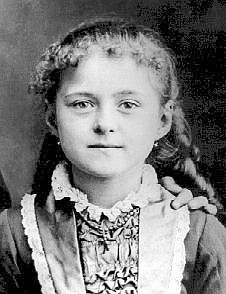From my favourite saint, my heavenly patron .. St. Thérèse!



Saint Thérèse in a popular representation.
Here's an excerpt from a testimony by Sister Marie-Joseph of the Cross, O.S.B. who was the maid and governess under the service of M. Guerin, St Thérèse's uncle, before she joined the Benedictine nuns of the Blessed Sacrament at Bayeaux. She was the 8th witness and she testified this on 12-15 December 1910.
"Shortly after her first communion, when she was about twelve, she used to talk to me about God: how good he was to those who loved him, the love he bore each of us individually. As I did not feel all that much love for him, and said as much to her, she explained that love was not a matter of what you felt but of practising virtue, and that we should always try to please God in the least of our actions, without any attempt to draw attention to ourselves."
When the witness, Marcelline, before she became a nun, told St Thérèse that she intended to become a nun, St Thérèse told her this:
"we must always Love God a great deal, and to prove that love we must make all the sacrifices he asks of us. Don't worry, I'll be praying for you. Love God so that you won't be too afraid of him; he is so kind, really! Remember too to pray for those who do not love him, so that we can convert many souls."
As such, love of God equates love of sacrifice. The true definition of love is:
Love = Sacrifice
Love and Sacrifice are 2 things so interconnected, they cannot be separated. If you say you love someone, you say that you are willing to give your life for that someone.
And, how beautiful that love is, so gentle, so warm, so tender, so infinite, that He would give up his life, hanging on something most disgusting, in order to bear the burden of our sins, our iniquities? And as I posted up a few months ago, in July,
-Whosoever on earth would endure all that, just to cleanse us of our iniquity?-
None other than the greatest love of All - Jesus.
I am now reminded of a paragraph I read some time ago in St Alphonsus Ligouri's book on The Passion and the Death of Jesus Christ.
(This is taken from Chapter 1: The Love of Jesus Christ in being willing to satisfy the Divine Justice for our sins.)
I.
We read in history of a proof of love so prodigious that it will be the admiration of all ages.
There was once a king, lord of many kingdoms, who had one only son, so beautiful, so holy, so amiable, that he was the delight of his father, who loved him as much as himself. This young prince had a great affection for one of his slaves; so much so that, the slave having committed a crime for which he had been condemned to death, the prince offered himself to die for the slave; the father, being jealous of justice, was satisfied to condemn his beloved son to death, in order that the slave might remain free from the punishment that he deserved: and thus the son died a malefactor's death, and the slave was freed from punishment.
This fact, the like of which has never happened in this world, and never will happen, is related in the Gospels, where we read that the Son of God, the Lord of the universe, seeing that man was condemned to eternal death in punishment of his sins, chose to take upon himself human flesh, and thus to pay by his death the penalty due to man: He was offered because it was His own will - Isa. liii. 7.
And his Eternal Father caused him to die upon the cross to save us miserable sinners: He spared not His own Son, but delivered Him up for us all. - Rom. viii.32 .
What dost thou think, O devout soul, of this love of the Son and of the Father?
Thou didst, then, O my beloved Redeemer, choose by Thy death to sacrifice Thyself in order to obtain the pardon of my sins. And what return of gratitude shall I then make to Thee? Thou hast done too much to oblige me to love Thee; I should indeed be most ungrateful to Thee if I did not love Thee with my whole heart. Thou hast given for me Thy divine life; I, miserable sinner that I am, give Thee my own life. Yes, I will at least spend that period of life that remains to me only in loving Thee, obeying Thee, and pleasing Thee.
-------
St Alphonsus Ligouri's writings are fabulous!! =) don't you agree? =)
and here's a link to one of the books I was blogging about in my previous post, its a really really really good book! =)
The Mystical City of God by Venerable Mary of Agreda
-------
Jesus, Mary, I love Thee, Save Souls!

























0 Comments:
Post a Comment
<< Home